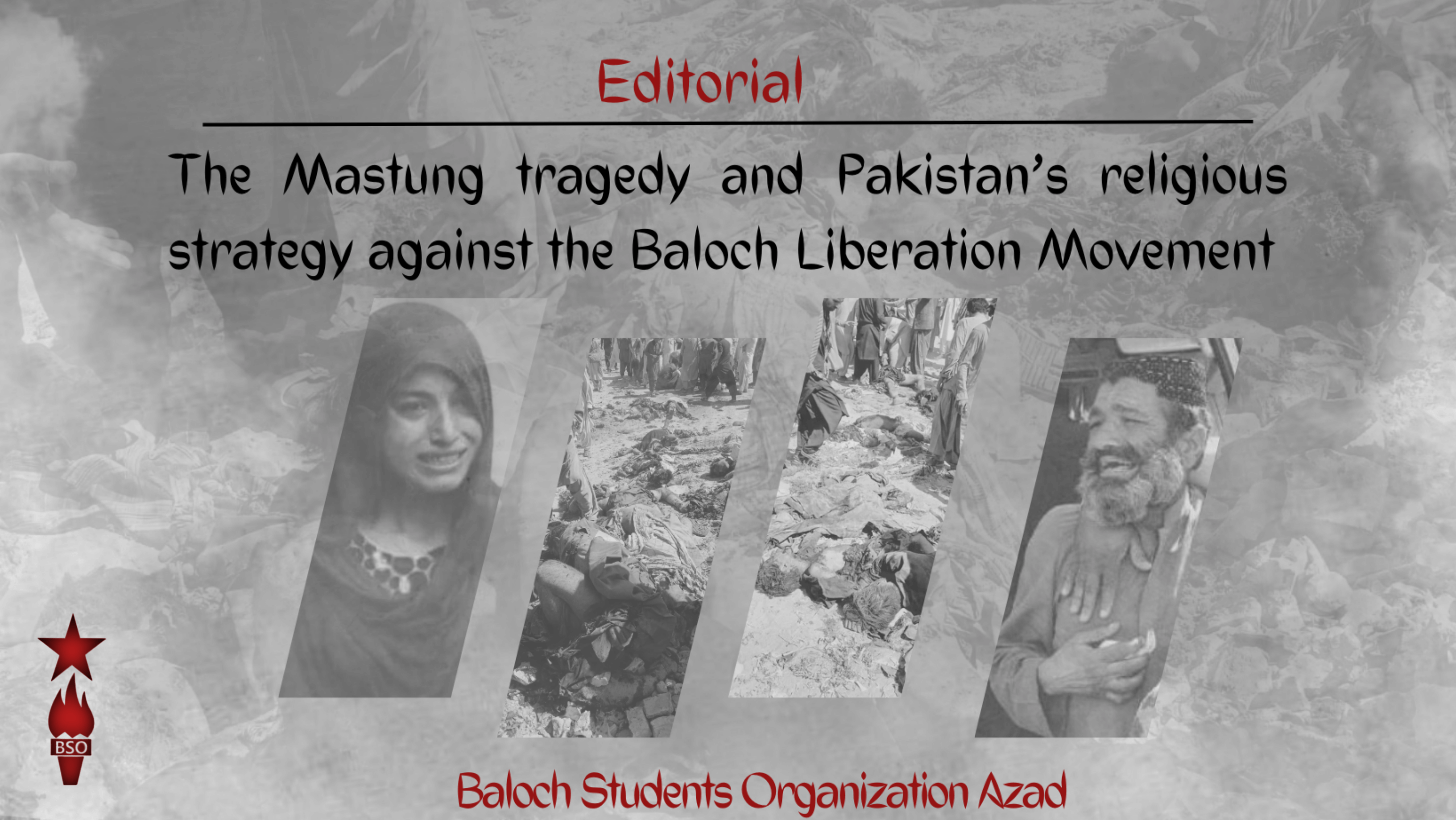The Mastung tragedy and Pakistan’s religious strategy against the Baloch Liberation Movement
Editorial
Earlier this week, a religious gathering of local people to mark Eid Miladun Nabi was targeted by a suicide bomber, resulting in the deaths of more than 57 people and injuring hundreds of others in Mastung city of Balochistan on September 29. The attack was massive in scale and one of the largest in recent times in Balochistan. It appears to be another attempt by Pakistani forces to divert the attention of Baloch people from the real issues and engage them in sectarian violence against each other. This is not the first incident in which Baloch has been killed in such attacks, often claimed by so-called Islamic terrorist organizations. However, the reality is that the forces responsible for these incidents are the army and intelligence agencies, which are harboring and training these groups to operate against the Baloch National cause.
It is no longer a secret that Pakistan is using multiple religious terrorist organizations to create chaos among the Baloch people and divert their attention from the state’s brutal actions in Balochistan. The Baloch National Liberation Movement is a secular movement based on Baloch Nationalism. The army is supporting individuals like Mulla Shahmir and Shafiq Mengal openly and providing them with space to operate throughout Balochistan. Shafiq’s connections with multiple international terrorist organizations are no longer a secret, yet he is supported by the intelligence agency to terrorize the local population and discourage them from joining the National movement. He was once a key commander of Lashkar-e-Jhangvi but later formed a so-called political party, now operating as the president of Jalawan Awami Panel, which is nothing more than a death squad run by the intelligence agencies.
On one hand, Pakistan diverts the attention of local people from the real issues it faces, while on the other hand, the army, by planning such attacks, seeks various advantages. Firstly, the state portrays itself as a victim of religious terrorism while, secondly, it receives financial support from Western countries to combat these forces, despite them being aware of the reality but supporting Pakistani forces for their own interests. Thirdly, Pakistan aims to convey to the world that Balochistan not only faces a war for independence but also sectarian issues. By staging such attacks on local people, Pakistan is continuing the Baloch genocide and exploiting these actions for strategic advantages, which is a serious concern for regional peace and neighboring countries.
In many areas like Kech and Awaran, operators affiliated with the Pakistan army have been involved in sectarian violence. An example is the killing of Zigri pilgrims in Awaran by forces personnel, later claimed by such groups. Similar incidents have occurred in Kech, Panjgur, Khuzdar, Gwadar, and different parts of Balochistan. All of them are believed to have been carried out to counter the National ideology among the common people. Mastung was once a center of Baloch nationalist struggle, with many known revolutionary cadres hailing from the area. However, the army have killed dozens of BSO Azad cadres as part of its “kill and dump” policy. After cracking down on political workers in Mastung, the army began creating groups based on religious identity to counter the nationalist movement in the area. This policy has been applied not only in Mastung but also across Balochistan, with varying degrees of success, which is a concerning issue.
The Baloch nation has never been a part of this religious warfare by the state. During the so-called Afghan war, when people across Pakistan were armed on a large scale, Balochistan distanced itself from this war, indicating the people’s resilience to their culture and nationalism. However, the state continues to push this narrative, and its operators allegedly persist with this policy to exert more control over the people. The international community is believed to be aware of these policies by Pakistani state agencies and the army. Western countries and their ideological allies have faced criticism for supporting Pakistan despite its role in promoting extremism. Pakistan’s policies have had devastating consequences for neighboring countries and now threaten to apply the same tactics in Balochistan to counter the liberation struggle of the Baloch people.
The Mastung attack is seen as an act not by a terrorist group but by a terrorist state that has illegally occupied Balochistan and continues its genocidal policies to strengthen its grip and occupation of Baloch land. This includes employing various tactics to create divisions among Baloch people and engage them in sectarian violence. The world is urged to support secular liberation movements like the Baloch liberation movement in the region, which promote peace and the freedom of the masses, rather than policies that lead to genocide, as in the case of Pakistan.

